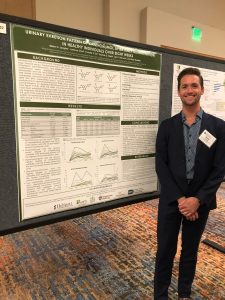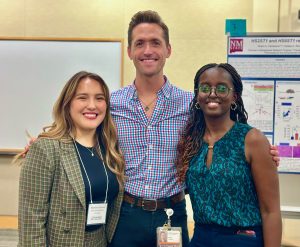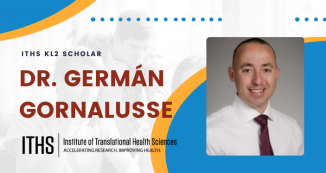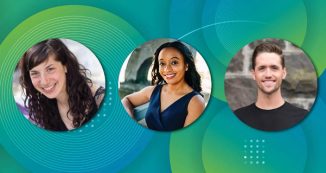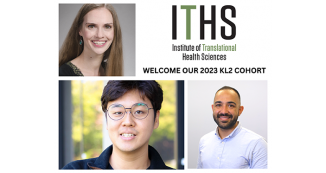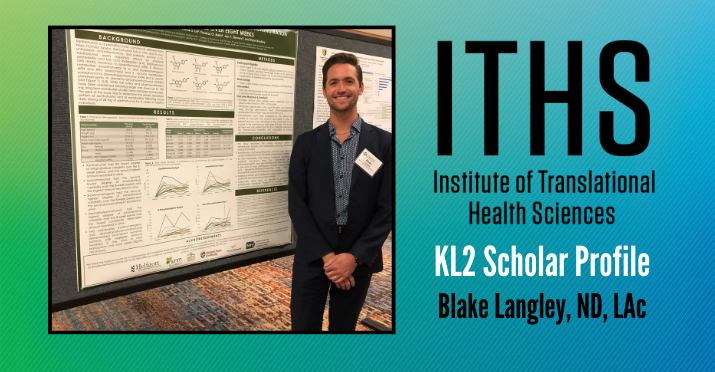
24 Jan ITHS Profile Series: KL2 Scholar Blake Langley
This year, we begin a new profile series to shed light on some of the distinguished scholars currently participating in our KL2 Program. We begin with Blake Langley, ND, LAc., who is clinically trained as a naturopathic physician and acupuncturist. Langley is currently a staff scientist at the Fred Hutchinson Cancer Center in the department of Cancer Prevention, Division of Public Health Sciences, as well as an ITHS KL2 scholar who joined the program in 2023. ITHS entered into his translational science journey very recently, offering support that help changed his career trajectory in an exciting way. He spoke to ITHS about his focus on integrative oncology, the acupressure research he’s most passionate about, and what challenges he expects to face in his journey.
Hi Blake! So glad you could join us today!
Thank you for having me!
Will you describe your education and experience before arriving at ITHS?
I graduated from the National University of Natural Medicine in Portland in 2019. I was a clinical investigator on a natural product trial at the school following graduation until 2022. During that time, I joined the Bridging Research across Inter-Disciplinary Gaps (BRIDG) T90 program as a postdoctoral fellow at the University of Washington.
Now, at Fred Hutch on the clinical side, I also work as a research acupuncturist.
Please tell us how you learned about ITHS and what drew you to participating:
My first exposure to ITHS was through joining a project which used the ITHS REDCap instance while a postdoctoral fellow. Then when I joined the Fred Hutch team, we attended the 2021 Team Science Workshop virtually. Around the same time, ITHS announced the funding opportunity made available by multiple NIH institutes, including the National Center for Complementary and Integrative Health (NCCIH) for administrative supplements to the National Center for Advancing Translational Sciences (NCATS) KL2 programs.
It was spring 2022 when ITHS released the call for applications and its support of applicants through the process. With an established mentor nearby at Fred Hutch, I submitted my letter of intent and was subsequently guided along the way for grant writing, design, and construction. The ITHS team was working alongside me throughout the entire process of getting the administrative supplement application fleshed out and submitted between July and October. It was a pretty quick turnaround, and ITHS did an amazing job of mentoring me through my first full grant application. A few months later, we saw the funding be accepted! Since then, it’s been great – extremely busy, but great.
How long have you been a KL2 scholar, and what makes this program unique?
I have been involved with the KL2 Scholars program since February of 2023, officially starting as a KL2 Scholar in July 2023. I am clinically trained, and my research is all in clinical trials, so my work lands in the middle of the translational research spectrum. I’m not all the way into later stage translational science, such as implementation and dissemination science, but not in the early stages of preclinical modeling or discovery either.
The KL2 program is interesting because there are many scholars on different parts of that spectrum. I love having my eyes opened wider and wider at every one of these seminars, learning about new colleagues’ individual experiences, backgrounds, and scientific discoveries.
I’m in awe of the incredible expertise of every other person who is in that cohort. It’s an absolutely outstanding group.
Please explain your area of study/research:
My research is focused on “integrative oncology,” using supportive care modalities focused mostly on lifestyle to address the patient concerns that arise from conventional cancer care. Conventional care is generally defined as chemotherapy, radiation, immunotherapy, hormone therapy, and surgery. Supportive care services are provided alongside conventional care and are meant to improve patient quality of life while they undergo active cancer treatment. Hopefully, this combination propels them into survivorship.
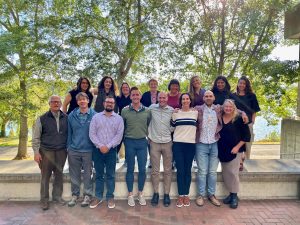
2022 Autumn Building Research across Inter-Disciplinary Gaps (BRIDG) T90/R90 cohorts with program directors.
When we’re looking at improving quality of life, much of the time we’re looking at reducing symptom burden and figuring out how to support patient thriving while undergoing and following cancer treatment. But we’re doing that with many different tools that can be delivered by different healthcare providers.
Behavioral interventions and lifestyle interventions like being more physically active, eating with intention, nutrition and hydration, smoking cessation, reducing alcohol intake, are some of the foundational pieces we address in integrative oncology.There are also interventions that integrative medicine can provide, like mindfulness practices (breathing and movement). These can decrease stress and anxiety and improve mood, especially important patients are likely experiencing pain, digestive issues, headaches, or neuropathy, which are common during cancer treatment.
We really try and cater to patients’ needs based on what they are open to and what they can realistically adhere based on their individual circumstances.
Where does your focus on acupuncture fit into that?
My research focus is on acupressure, and how it can be self-administered as part of an overall wellness plan. Acupuncture, for those who don’t know, uses for the most part, small, fine needles that we insert into some very specific points on the body to improve energy – or what is called Qi – flow through the body, where blockages in that flow tend to create symptoms.
Most of the research that’s been done on acupuncture is using those needles, and the treatment is delivered by a trained and licensed acupuncturist. One challenge with that is that it’s not always available to patients, especially in rural areas. Another challenge is that patients may be needle-averse, because they’re already undergoing a lot of treatments in their journey.
Where my passion point lies, is that integrative medicine is generally not an accessible form of medicine for the majority of people. It’s not always covered by insurance and realistically speaking, the majority of Americans can’t afford out of pocket medical care. Additionally, acupuncture requires specific licenses. You then get very limited on who knows oncology and acupuncture together. And are you going to be in a metropolitan area? If not, it’s very likely these treatment options will be limited to you.
So one of the ways we can possibly bridge these gaps is through acupressure. That’s where you can use those same key body points, but instead of using a needle, you can use gentle self-stimulated or provider-stimulated massage to access those key points to help provide treatment for certain symptoms. Using the same maps on the ear, using tools called ear seeds, you apply very small pellets or beads to those points instead of needles. Instead of massaging the points on the body, patients would do that on the ear. We’re trying to see whether we can train conventional providers as well as patients on how to accurately locate those points to get the results they want. We’re also looking at whether or not they can address symptoms that patients experience while they undergo cancer treatment. So we’re working with patients with upper-GI cancers who are on chemotherapy and have subsequently had a lowered appetite, which puts them at risk for negative treatment outcomes. We anticipate that by working with them on appetite stimulation, we may be able to have an early intervention to prevent subsequent dangerous weight loss.
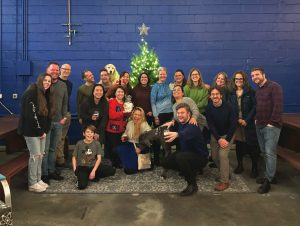
2023 holiday celebration for the Fred Hutchinson Integrative Medicine Clinical and Greenlee Studies Research Teams
My research centers on seeing if interventions like using ear seeds can work, but also if they can be implemented and scaled outside of urban settings.
There’s a balance of being innovative versus realistic. You can be hyper-innovative, but it may not work. And so we’re trying to find that balance right now.
You’ve recently made a change in your area of focus – tell us more about that.
After I graduated in 2019, I found myself doing interesting research work, but I wasn’t passionate about the topic I was focused on. I have had a deep-seated interest in cancer care since working in different oncology settings in naturopathic medical school, so I looked to move into that domain and learned how underrepresented naturopathic doctors and acupuncturists are in academic research settings. I was lucky enough to find Dr. Heather Greenlee at Fred Hutch, who opened up the Integrated Medicine clinic as well as the Greenlee Studies Research Lab. After 14 years of her intensive work and pushing for an integrative medicine footprint at Fred Hutch, she finally established a team back in 2017. When I found her, I knew I wanted to change my focus and mentee under her. It was only about 3 months after our introduction and me working on her team that the ITHS released their call for letters of intent for the administrative supplements. So, my transition to this area of study was a whirlwind, and it couldn’t have happened without the guidance of the ITHS team and the application, as well as the expertise of my mentors at Fred Hutch. But you have to be ready to jump on an opportunity, or at least to seek out an opportunity when it’s released!
I think that leads in nicely to my next question: What are some of the challenges you faced so far when advocating for this inclusive approach?
The biggest issues that I have been facing right now are figuring out the institutional operations that will allow us to get the trial off the ground. Lessons are still being learned for how to really get trials in such a large academic setting to take off and be in orbit.
I am implementing an interventional clinical trial and that comes with a host of coordination pieces. Part of that is really figuring out how integrative medicine gets mixed with conventional care and how we implement the trial, not be a burden to patients, and not be a burden to other providers.
And that logistics and operations piece? That’s what most KL2 scholars are focusing on.
Many are going to be doing feasibility studies if they are focusing on clinical trials. And that’s part of what we as KL2 scholars learn is you are playing a long game of finding grants, being innovative, and working on a 5-to-10-year timeline.
Our question during the career development period is: how do you build out your career (and funding) sustainably?
What are you hoping to accomplish with ITHS?
It’s about this concept of preliminary evidence that we all are trying to generate. That’s my next two years. But my next six months is going to be figuring out how patients get recruited into the trial.
And then after that, it’s asking, does this (the intervention, the study design and framework, etc.) work? Does this not work? My clinical training tells me these interventions will work and I hypothesize there will be an effect, but learning how to investigate that is one small piece of really what I want to see. I need to figure out how to translate what we take away from this pilot and turn it into more broadly acceptable health solutions.
But how do we then look from a bench to bedside translation, and potentially translate it into health policy supporting health equity and patient access to integrative oncology? How do we repeat the success across the region – or figure out if this can be replicated elsewhere?
It’s a big challenge to stay inspired and driven enough to continue pursuing that goal over the next however many years.
What professional goals, related to your research, do you have in 5 years? 10 years?
Having an impact. Just two hours ago, somebody reached out to my PI to say thank you for the integrative approaches they learned about 15 years ago when they were a caregiver. They have cancer and said they now can seek out integrative medicine because that program taught them how to do it.
My upbringing is a big part of what keeps me motivated too. I come from the southeastern part of the U.S., which generally has very minimal access to integrative medicine. I’m passionate about figuring out ways to see that integrative medicine is more broadly represented in the healthcare system, especially in oncology settings beyond just this one small piece of integrated oncology.
Patient stories and the potential that we may find a way to support patients beyond our clinical trials to get through their cancer treatments and survive and thrive post-treatment is huge. That’s really impactful when you work in clinical research, as you usually see the patient during the trial and then you don’t see them later. To know I’m part of a team that has been doing this for so long and making an impact is important to me.




